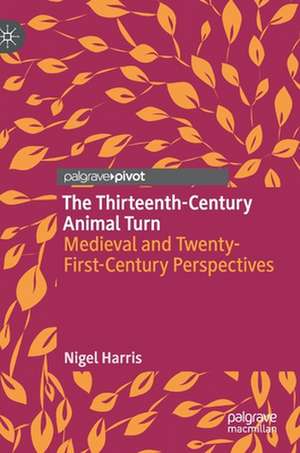The Thirteenth-Century Animal Turn: Medieval and Twenty-First-Century Perspectives
Autor Nigel Harrisen Limba Engleză Hardback – 29 aug 2020
The Thirteenth-Century Animal Turn: Medieval and Twenty-First-Century Perspectives examines a wide range of texts to argue in favour of a thirteenth-century animal turn which not only generated a heightened scholarly awareness of animals but also had major implications for society more generally. Using diverse primary sources, the book considers the role of Aristotle in shaping thirteenth-century perspectives on natural history; Pope Innocent III’s encouraging the use of animals in the theological and moral instruction of the laity; the increasing relevance of animals to the promotion and assertion of lay aristocratic identity; and the tension between violence and affection towards animals that pervaded the thirteenth century as it does the twenty-first. Analysing these many considerations, Nigel Harris also argues that the thirteenth century was an era in which traditional conceptions of the fundamental ‘anthropological difference’ between humans and animals was subjectedto increasingly urgent questioning and challenge.
Preț: 489.30 lei
Nou
Puncte Express: 734
Preț estimativ în valută:
93.63€ • 98.00$ • 77.93£
93.63€ • 98.00$ • 77.93£
Carte tipărită la comandă
Livrare economică 31 martie-14 aprilie
Preluare comenzi: 021 569.72.76
Specificații
ISBN-13: 9783030506605
ISBN-10: 3030506606
Pagini: 131
Ilustrații: IX, 131 p.
Dimensiuni: 148 x 210 x 16 mm
Greutate: 0.45 kg
Ediția:1st ed. 2020
Editura: Springer International Publishing
Colecția Palgrave Macmillan
Locul publicării:Cham, Switzerland
ISBN-10: 3030506606
Pagini: 131
Ilustrații: IX, 131 p.
Dimensiuni: 148 x 210 x 16 mm
Greutate: 0.45 kg
Ediția:1st ed. 2020
Editura: Springer International Publishing
Colecția Palgrave Macmillan
Locul publicării:Cham, Switzerland
Cuprins
1. Introduction.- 2. Aristotle and Thirteenth-Century Animal Studies.- 3. Innocent III and Thirteenth-Century Animal Imagery.- 4. Animals and Thirteenth-Century Chivalric Identity.- 5. Violence, Affection and Thirteenth-Century Animals.- 6. Conclusion.
Notă biografică
Nigel Harris is Reader in German at the University of Birmingham, UK.
Textul de pe ultima copertă
“Nigel Harris’s book makes for a fascinating read. It manages to construct a compelling bigger picture as well as give an insight into numerous intriguing examples of human-animal relationships in medieval literature. The range of texts discussed is impressive and so too is the author’s ability to bring so many different medieval literary works to life.”
— Sebastian Coxon, Reader in German, University College London, UK
“This engaging book both establishes an important and convincing new line of argument within the field of medieval animal studies and provides an excellent introduction to the function and treatment of animals in the Middle Ages more broadly. It’s also a seriously enjoyable read.”
— Sarah Bowden, Senior Lecturer in German, King’s College London, UK
Nigel Harris is Reader in German at the University of Birmingham, UK.
Caracteristici
Examines an expansive range of medieval texts in English, Latin, German, French, and Italian Combines the methodology of contemporary Animal Studies with that of traditional German philology Provides a prehistory for the animal turn of the twenty-first century
